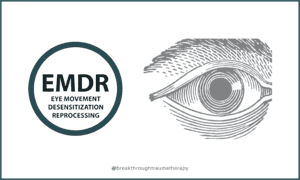There is a growing interest in eye movement desensitization and reprocessing (EMDR) therapy beyond trauma-related mental conditions. With evidence in research showing the correlation between trauma and borderline personality disorder (BPD), EMDR is an effective treatment. EDMR therapy helps you process unresolved traumatic experiences through bilateral stimulation. It can effectively help you address the root cause of borderline personality disorder. Before delving deep into the treatment, understanding BPD and its connection to EMDR is necessary.
What is Borderline Personality Disorder?
BPD is a psychological condition characterized by extreme mood swings, uncontrollable emotions, and relationship instability. While there is no single cause of BPD, research has identified genetic and environmental factors. The likelihood of getting BPD increases if one or both of your parents have the mental condition.
MRI studies show a decrease in volume and increased activity in the amygdala, the brain’s stress processing center that is responsible for regulating negative emotions. The changes are also prevalent in the hippocampus, which integrates experiences into memories, adding the appropriate context and meaning, and the prefrontal cortex, responsible for emotion processing, decision-making, and memory retrieval.
Aside from the genetic aspect, certain environmental factors also cause BPD. Unresolved trauma from adverse childhood experiences like exposure to abuse, neglect, violence, sickness, or death can morph into BPD. Exposure to physical, emotional, or sexual abuse at any stage of life without any intervention can cause BPD.
Symptoms of Borderline Personality Disorder
- Fear of abandonment – going to extreme lengths to avoid real or perceived abandonment
- Unstable and intense relationships – characterized by extreme ideation followed by devaluation.
- Distorted self-image and self-worth – overwhelmed by feelings of worthlessness and emptiness
- Extreme mood fluctuations ranging from euphoria to deep depression
- Impulsive, maladaptive behaviors, from substance abuse to promiscuity, binge eating, and overspending
- High risk of self-harm – characterized by self-cutting, burning, hitting to cope with intense emotions
- Suicidal ideation and attempts – BPD has a higher suicide risk and self-destructive behavior
- A chronic sense of emptiness, feeling unfulfilled or content with life
- Sudden emotional outbursts such as anger and irritability that are uncontrollable
- Short-lived periods of paranoia or detachment from reality
- Black and white thinking – viewing people and situations in extremes
How EMDR Correlates With BPD
Adaptive Information Processing (AIP) model is the foundation of EMDR treatment. The model shows how the amygdala, hippocampus, and prefrontal cortex operate in processing and retrieving healthy memories. In adaptive situations, the amygdala will sense and assemble negative sensations, process them, add meaning, and transmit them to the hippocampus.
The hippocampus encodes this information into short-term memory and stores it in memory networks as long-term memory through a process known as consolidation. It also works in conjunction with the prefrontal cortex, adding depth to memory by incorporating contextual information, such as the emotions associated with the experience.
When you experience trauma, the AIP model shows these three brain regions fail to process the memories effectively, forming isolated memory networks. The fragmented networks have disjointed memories wrongly packaged due to anomalies starting from the amygdala.
As the MRI studies show, trauma interferes with the size and function of the amygdala, hippocampus, and prefrontal cortex. The amygdala becomes hyperactive and oversensitive to stimulation, picking up phantom sensations and prematurely activating the hippocampus. The hippocampus, in turn, retrieves the fragmented memories, activating the prefrontal cortex to release a barrage of emotions without processing them to ascertain their validity. The resulting response is usually too overwhelming in relation to the initial trigger.
In the case of BDP, the physical manifestation of the condition after exposure to trauma triggers, like a loved one working late or perceived hatred or fears, evoke uncontrollable anger, sadness, or irritability. The glitch in memory processing pushes you to control your loved ones, become increasingly distrustful, judge people without context, or develop a strong sense of worthlessness. It also interferes with your ability to cope with current trauma and adverse life experiences.
How EMDR Therapy Works in Treating BPD

The purpose of EMDR therapy is to facilitate the brain’s natural healing process by processing and integrating traumatic or distressing memory network fragments. Therapists use bilateral stimulation to activate the brain’s processing system. They can:
- Move their finger from the right eye to the left
- Tap alternatingly on both your knees
- Let you listen to consistent music rhythm, beats, or clicks through headphones.
As the therapist performs the bilateral stimulation, the patient concentrates on a specific traumatic memory. Both techniques (concentration and bilateral stimulation) help your brain integrate the isolated memory into a healthy adaptive network. The resolve primes your mind into a state that can readily heal, understand, and learn from past events, and build resilience.
EMDR does not require understanding the underlying cause to facilitate healing like cognitive behavioral therapies (CBT). It also increases your reception toward cognitive restructuring interventions. Therapy occurs in 6-12 sessions, with many patients experiencing relief before the entire cycle is complete.
Benefits of EMDR Therapy in Treating BPD
EMDR is an effective treatment for BPD because the condition stems from trauma. The simple treatment undoes the effect of trauma on the brain, enabling it to process healthy memories, emotions, and behaviors. The therapy
- Increases your affinity toward responding to therapy positively
- Boosts your propensity toward learning coping adaptive behaviors
- Resolves the underlying problem hindering your ability to develop healthy relationships
- Reduces the pain, fear, and anger associated with your traumatic experiences
- Keeps your mind in an adaptive state, inhibiting self-destructive and suicidal tendencies
Start Your Recovery Journey Today
BPD is a debilitating mental condition that interferes with your ability to reason, process your thoughts and emotions, heal from traumatic experiences, and overcome adverse life experiences. You do not have to forebear with the weight of this condition. There is a way out. You deserve a healthy life and fruitful relationships.
With EMDR therapy you can find relief from the shackles of BPD. All you have to do is find a counseling psychologist with experience in EMDR therapy. Your healing journey can begin today. You decide, one day or day one.
Contact Us
